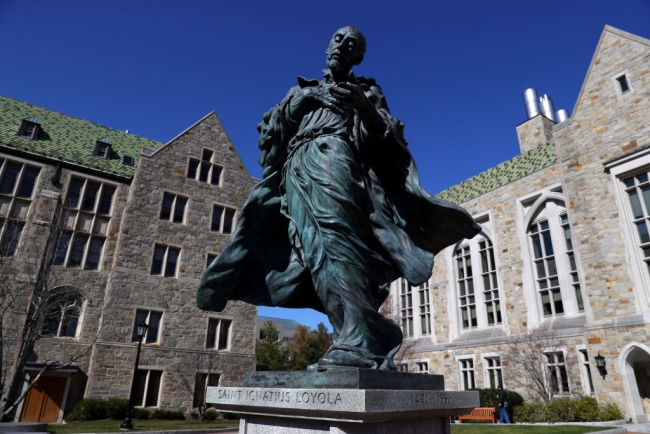You have /5 articles left.
Sign up for a free account or log in.

Maddie Meyer/Staff via Getty Images
Students and alumni at Boston College have pushed the Roman Catholic institution to divest from fossil fuels for nearly a decade. On Tuesday, they took their fight into the legal arena.
A group including Boston College alumni, politicians and scientists filed a complaint with the Massachusetts attorney general’s office, arguing that Boston College trustees have violated their fiduciary duty by refusing to divest college endowment funds from fossil fuel companies.
“The Trustees of Boston College have failed to consider the charitable purposes of the institution and the purposes of the institutional fund by financially supporting the degradation of the climate, widespread damage to ecological and human health, and massive injuries to environmental and social equity,” the complaint said.
The complaint follows years of conflict between students and Boston College administrators over climate change issues and fossil fuel investments. Student activists say they’ve faced immense pressure from administrators to drop the issue and have been threatened with academic probation for speaking out against the college’s fossil fuel investments. Boston College maintains a position it has held for years: divestment from fossil fuel companies is not an effective means of addressing climate change.
State attorneys general are tasked with overseeing charitable organizations, including nonprofit colleges, and can open investigations into the financial actions of nonprofits. Taking divestment fights to the AG's office is not unprecedented -- students at Cornell University filed a similar complaint with the New York attorney general's office last year. Months after the complaint was filed, Cornell announced plans to divest from the fossil fuels industry.
Colleges’ divestment from fossil fuels has been a hot topic in recent years. Dozens of institutions -- including American University, Middlebury College, Brown University, Georgetown University and Cambridge University -- recently announced they have divested from fossil fuels or that they intend to divest from fossil fuels within several years.
Roman Catholic institutions faced additional pressure to divest this summer. In June, the Vatican urged them to divest from fossil fuel companies. Some Roman Catholic colleges, such as Georgetown and the University of Dayton, have already done so.
Boston College continues to hold out. Student activists estimate that $200 million of the college’s $2.5 billion endowment is invested in fossil fuel companies. The college did not say whether that estimate was accurate.
Reduced energy consumption and enhanced sustainability measures are more effective means of combating climate change, according to a statement from the college.
“As with most colleges and universities, Boston College is opposed to divestment from fossil fuel companies on the grounds that it is not an effective means of addressing climate change,” Jack Dunn, a spokesperson for the college, wrote in an emailed statement. “The endowment exists to provide a permanent source of funding for financial aid, faculty chairs, and student programs, as well as the University’s academic and research initiatives, and is not a tool to promote social or political change, however desirable that change might be.”
There is some precedent of divestment at the college. In the 1980s, Boston College divested a small fraction of its endowment portfolio from companies doing business in South Africa amid student pressure to do so in order to fight segregationist apartheid policies in the country.
The Reverend J. Donald Monan, a former Boston College president, emphasized in a 1985 college newspaper article that divestment was not a moral response to South African apartheid, nor a strictly financial move.
“In considering the advisability of disposing of even these few remaining securities, we recognized that, from the standpoint of our fiduciary responsibilities for the College's funds, there were so many available investment opportunities of at least equal value, that the retention of our existing stocks would be neither more nor less financially beneficial to the University than many other investments available,” Monan wrote.
Investment strategies at nonprofits are similar to those at for-profit corporations, said CJ Ryan, an associate professor of law at the Roger Williams University School of Law who has researched the financial impact of colleges’ fossil fuel divestment.
Typically, investment managers have a fiduciary duty to maximize returns for their beneficiaries, or shareholders. Exactly who counts as a beneficiary of Boston College is unclear.
“A not-for-profit, charitable organization is still a corporation. They’re governed by corporate law,” Ryan said. “The difference, though, is that there aren’t any shareholders. You can’t buy a piece of Boston College.”
For any portfolio manager, making an investment decision based purely on ethical or social grounds is controversial, Ryan said.
“They want to make safe decisions,” he said. “They’re not going to make decisions that result in short-term loss, or even that are speculative in the long term. They want to grow the size of the endowment and increase its return.”
But fossil fuel divestment is no longer a purely ethical or moral issue. For years, oil and gas stocks have performed poorly. The COVID-19 pandemic could hasten a decline of the fossil fuel industry because fewer people are driving or flying. As more and more people lean on organizations to sever ties with fossil fuels, the economic outlook for the industry darkens.
“The stock prices of some of the largest fossil fuel companies have really declined over the last several years, such that the S&P 500 has dropped ExxonMobil from its benchmark index,” Ryan said. “What was once a blue-chip stock is no longer viewed as one.”
In his research, Ryan and his co-author Chris Marsicano, an assistant professor at Davidson College, found no negative effect of divestment from fossil fuels at colleges with large and midsize endowments.
Boston College alumni, scientists, politicians and advocacy groups, with the help of Climate Defense Project, a nonprofit legal defense group, filed their complaint Tuesday with the office of Massachusetts attorney general Maura Healey. The group hopes to hear back about a potential investigation within one week, said Kyle Rosenthal, a senior at Boston College and a member of student climate activism group Climate Justice at Boston College.
If the attorney general decides to open an investigation into Boston College’s investment practices, the details of the investigation and how transparent the process will be are decided by the AG’s office. Because Healey’s office also oversees Harvard University, Boston University, Tufts University and the Massachusetts Institute of Technology, Rosenthal expects that any investigation into Boston College will also look into investment practices at those institutions.
Rosenthal said he hopes that Boston College will pre-empt any directive from the attorney general and choose to divest from fossil fuels on its own.
“Our hope is that this doesn’t have to become an investigation,” he said.
A Long Fight for Divestment
Student activists have been battling the Boston College administration about divestment for years.
Students in the Climate Justice at Boston College group have noticed undercover public safety officers at their events, Rosenthal said. In 2017, John King, then the college’s executive director of public safety, sent an email suggesting that a plainclothes officer be present at a Climate Justice event. Rosenthal also said that student climate activists have been threatened with academic probation during meetings with administrators.
Two years ago, two students were detained by campus police after writing chalk messages on the sidewalk that said “Black Lives Matter,” “What Would Jesus Do” and “Divest From Fossil Fuels,” among other activist slogans and policy suggestions.
Matthew Barad, a 2019 graduate and former member of Climate Justice at Boston College, and James Mazareas, a 2003 graduate who had returned to the college to pursue a master’s degree, said that campus police held them for at least an hour after they were discovered writing the chalk messages on campus. Both were accused by the college of property damage and issued a $50 fine, Barad said.
In April, Rosenthal received an email from Tom Mogan, the associate vice president for student engagement and formation, asking that he “cease sending emails to senior administrators with language that includes demands and threats.”
“As the University has made clear in multiple communications, our position on divestment is firm,” Mogan wrote. “As I mentioned in previous meetings, communications by you and members of your group that include demands and threats are counterproductive and work against your stated goal of having a productive dialogue.”
Mogan's email was in response to a message Rosenthal sent to William Leahy, the college’s president, Rosenthal said. In his message, Rosenthal urged the college to make additional commitments to combating climate change on Earth Day.
“I don't just ask for divestment or carbon neutrality lightly or immediately, but I ask for something, some true act and a collaboration with students and faculty in a formal capacity,” Rosenthal wrote in the April email. “Whether that's a climate action or sustainability task force or something else, I pray and hope that something is done and soon. This pandemic is related to environmental issues with polluted neighborhoods (many minority) having more deaths and other complications and we see that in our own city of Boston.”
When asked, Boston College did not address the alleged threats of academic probation; the emails between Rosenthal, Mogan and Leahy; or the detainment of Barad and Mazareas. In a statement, Dunn, the college spokesperson, called the allegations specious.
“Our Climate Justice students are passionate about the issue, and we respect their passion, but we do not intend to legitimize specious allegations with a response,” he wrote in an email.
Barad said the administration’s response to the climate advocates has been consistently negative.
“I’m amazed by the time and resources that these higher-level administrators spend trying to discourage a group of 20 to 30 students from protesting against fossil fuel investments,” he said.
Regardless of Boston College’s decision, the trend is toward divestment, Ryan said. There’s financial safety in numbers, and as more and more institutions choose to pull out of the fossil fuels industry, those investments become more fragile.
“I don’t know what the books look like for Boston College,” Ryan said. “But the reality is, this position looks weaker every day.”




